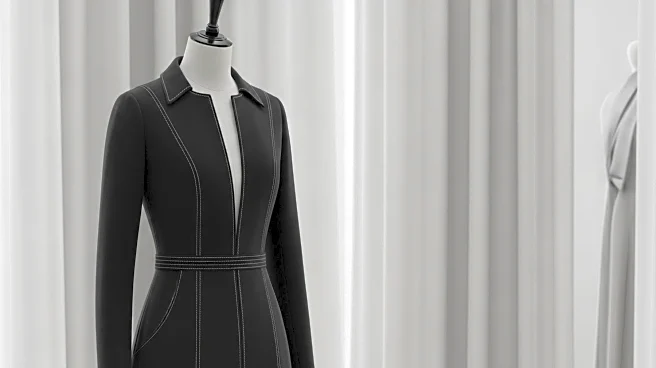What's Happening?
Designer Yohji Yamamoto presented his latest collection at Paris Fashion Week, focusing on the essence of his signature style. The collection featured monochrome, urban, and fluid silhouettes, with subtle touches of rebellion. The show opened with pared-down black looks, some adorned with graffiti motifs, followed by fringed ensembles that softened the severity. Tartan patterns appeared in shredded, deconstructed forms, adding a jolt of pattern to the meditations on black. White gowns trailed in strips, creating an ethereal yet raw appearance, while foliage-like bands traced torsos like abstract vines. The collection concluded with red sculptural coats, adding a dramatic flourish. At 81, Yamamoto continues to resist fashion's cycles, leaning into simplicity and balancing fragility with empowerment.
Why It's Important?
Yamamoto's collection is significant as it challenges the fashion industry's constant pursuit of novelty. By focusing on timeless designs, Yamamoto emphasizes the enduring appeal of simplicity and deconstruction. His approach offers a counter-narrative to the fast-paced, trend-driven nature of modern fashion, highlighting the value of esoteric and emotional design. This collection may influence other designers to reconsider the importance of timelessness and personal expression in their work, potentially leading to a shift in industry standards and consumer preferences.
What's Next?
As Yamamoto continues to showcase his unique style, the fashion industry may see a growing appreciation for designs that prioritize timelessness over fleeting trends. Other designers might be inspired to explore similar themes, leading to a broader movement towards sustainable and enduring fashion. Additionally, Yamamoto's influence could encourage consumers to invest in pieces that offer longevity and personal significance, rather than following short-lived trends.
Beyond the Headlines
Yamamoto's refusal to chase novelty highlights an ethical dimension in fashion, advocating for sustainability and mindful consumption. His work challenges the industry's reliance on fast fashion, which often leads to environmental degradation and exploitation. By promoting designs that endure, Yamamoto contributes to a cultural shift towards valuing craftsmanship and thoughtful design, potentially influencing both industry practices and consumer behavior in the long term.









